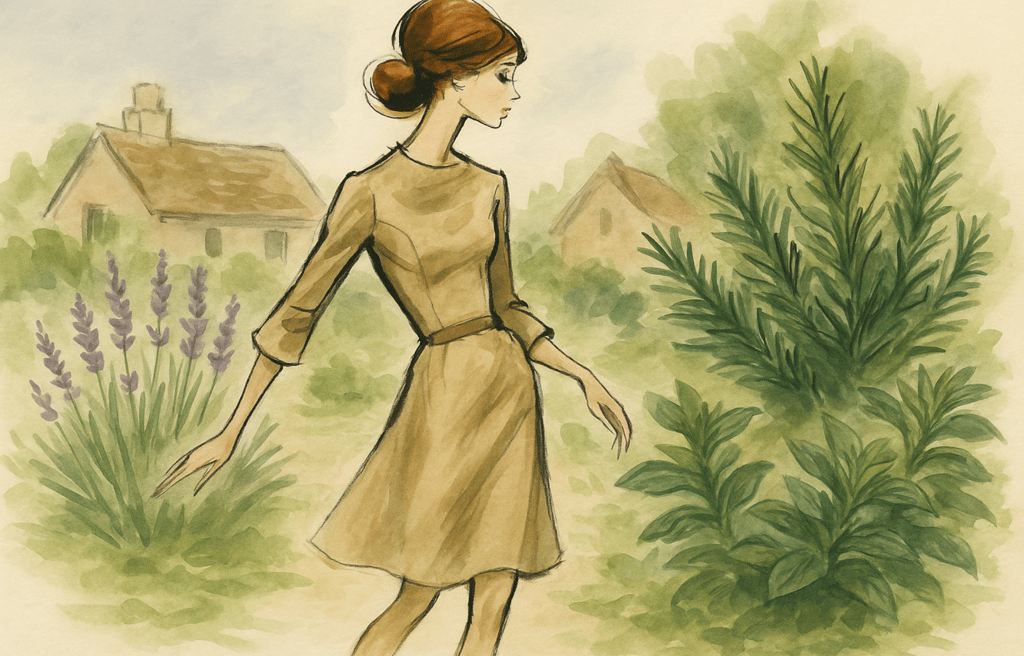Cottage Herb Gardens: Grow Lavender, Mint & Rosemary for Everyday Use
Grow lavender, mint, and rosemary by your door for a cottage garden that flavours food, repels pests, and soothes your home naturally.
ECO


The Herb Garden by the Door
Every old homestead had a small garden by the kitchen door — not just for flavouring food, but for protection, medicine, and scent. Herbs were the first defence against insects, sickness, and sour moods.
Lavender hung in wardrobes, rosemary smouldered in the hearth to cleanse the air, and mint trailed along thresholds, its cool scent a natural guard. These weren’t “luxuries” but part of everyday life, woven into meals, rituals, and chores.
Today, you can revive that old rhythm by planting your own cottage herb garden — a patch of living fragrance and utility, feeding you while keeping your home sweet and bug-free.
Lavender: Dream-Keeper and Protector
In every folk tradition from Provence to Transylvania, lavender is the house guardian.
Repels moths, flies, and mosquitoes — its oils naturally discourage pests.
Soothes nerves and aids sleep — brewed as tea or diffused as oil.
Feeds pollinators — its blossoms hum with bees, ensuring healthy gardens.
Folk Story: In old Romania, it was said that a sachet of lavender under your pillow would keep nightmares away and “tie up” wandering spirits that visited sleepers. Families also lined linen chests with dried lavender to protect fabric and dreams alike.
Mint: The Threshold Keeper
Mint is more than tea. It’s a living guardian.
Repels ants, spiders, and mosquitoes when placed at entrances or rubbed fresh on skin.
Freshens the air naturally in kitchens and pantries.
Grows vigorously — best contained in pots to keep it from overtaking your garden.
Folk Story: In Mediterranean villages, mint was planted near water barrels to mask standing water smells and discourage insects. In some homes, mint sprigs were scattered across thresholds during summer festivals to “welcome friends, not pests.”
Rosemary: Smoke, Memory, and Strength
Rosemary carries a reputation as both protector and purifier.
Repels cabbage moths, flies, and mosquitoes when burned or infused.
Adds depth to roasts, stews, and infused vinegars.
Symbolises memory — used in rituals to cleanse homes after illness.
Folk Story: In Balkan folklore, a rosemary sprig burned at dusk would not only keep biting insects away but “sweep” away lingering grief after funerals. Many believed the herb could carry the soul’s heaviness out on its smoke.
Building Your Own Cottage Herb Garden
Even a few pots on a sunny windowsill can serve as your “door garden.” For a full effect:
Choose a sunny spot near your kitchen or patio for easy access.
Plant lavender, mint (in pots), and rosemary as your base trio.
Add companion herbs like thyme, basil, or sage for diversity.
Use terracotta pots — they keep roots cool and blend with cottage aesthetics.
Harvest regularly to keep plants bushy and oils strong.
Everyday Uses for the Harvest
Bring your herbs indoors in every season:
Sachets & Wardrobe Bundles – Dried lavender and rosemary protect clothes and scent drawers.
Cleansing Smoke Bowls – Burn a pinch of rosemary and thyme in a heatproof bowl to freshen rooms.
Herbal Sprays – Infuse rosemary or lavender in vodka for a natural cleaning or bug-repelling spray.
Healing Tea – Lavender for calm, mint for digestion, rosemary for circulation.
Cooking & Preserving – Add fresh sprigs to roasted vegetables, vinegars, and soups.
Rituals to Revive
Our ancestors used these herbs beyond practicality. You can revive some of those simple, seasonal rituals:
Lavender Bath Salt – Crush dried lavender with sea salt; sprinkle into warm baths for relaxation.
Mint Doorway Garland – Twine mint and thyme into a rope to hang above doors in summer; a nod to old customs of protection.
Rosemary Smoke Cleansing – Burn rosemary on the porch during the first warm evenings to “invite a healthy summer.”
Why These Three Are Essential
Together, lavender, mint, and rosemary create a triangle of protection and purpose:
They feed pollinators while keeping pests away.
They flavour, heal, and scent your home naturally.
They link you to a long chain of household wisdom — from bunica’s kitchen garden to your own doorstep.
Planting them isn’t just gardening. It’s a way of bringing the old ways back into daily life — soft, sustainable, and alive with meaning.
Read more on:
Buzz Off, Naturally: Folk Ways to Repel Insects Without Harsh Chemicals
How to Create a Pollinator-Friendly Garden (Without Inviting Pests Inside)
Make Your Own Herbal Incense for Cleansing & Calm
10 Folk Ways to Make Your Home Smell Fresh Naturally
